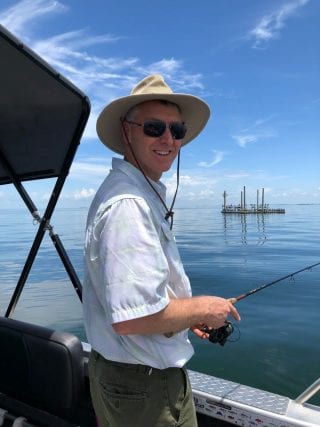A Q&A with Physics’ Paul M. Thibado
 Paul M. Thibado, Ph.D.
Paul M. Thibado, Ph.D.
Professor in the Department of Physics
In this conversation, Thibado talks about being a condensed matter experimentalist, cultivating one-on-one research relationships with his students, licensing the patented material his lab created, enjoying traveling and running on Mount Sequoyah with his wife, and the importance of perseverance and a sense of curiosity.
Q: Tell us a little about your research, academic passions and/or role within the college. What excites you about this?
I’m a condensed matter experimentalist. I use scanning tunneling microscopy to examine materials at the atomic scale.
For the past ten years, I’ve been studying the vibrational properties of freestanding 2-dimensional materials with a thickness of a single atom.
What’s interesting about these materials is that they are constantly in motion, even if we attach a charge to their surface.
We recently developed an electronic circuit which converts their continuous motion into stored electrical charge. We can use this charge later to power a small device, creating a new energy source with great potential.
Q: How long have you been at Fulbright College? What have you enjoyed most about your time here?
I started as an assistant professor in the Department of Physics more than 20 years ago, in 1996.
What I’ve enjoyed most about working in the Fulbright College has been the opportunity to pursue basic research that impacts not only the scientific community but society, as well.
In addition, I am pleased and grateful that both of my daughters have received an excellent education and research opportunities of their own through the Fulbright College.
Q: What do you most hope your students remember from their classes and/or interactions with you?
I primarily teach graduate-level physics courses, and have Ph.D. candidates working with me on a daily basis.
One of my recent graduate students is now a faculty member at Harding University. A few weeks ago, he reached out to me to see if we could collaborate on a project. His experience working with me as a graduate student was a positive one. That’s the kind of relationship I try to cultivate with all of my students.
Q: What do you like to do during your time outside of the university?
My wife and I love to travel. We both have many siblings living all over the country, so we spend a lot of our vacation time visiting family.
This fall I’ve was invited to give a presentation at the University of Shanghai, so we traveled to China together for the first time.
We also enjoy hiking, and had the pleasure of spending time exploring the trails of Olympic National Park and Mount Rainier National Park on a trip to the Pacific Northwest last summer.
We keep in shape by running in our Mount Sequoyah neighborhood and working out regularly at the HPER gym. Running the Chile Pepper Open 10K every fall is a tradition of ours.
Q: What’s up next on the horizon for you?
The university recently licensed patented technology my lab developed to a company based in Illinois. As I mentioned earlier, this technology converts the continuous motion of 2D materials into stored electrical charge.
I’m working with the university and this company to base our research and production efforts at the Arkansas Research and Technology Park in Fayetteville. One of the many positive outcomes of this project will be providing employment and valuable research experience to University of Arkansas students.
Q: Is there anything else you’d like to add or let readers know?
With the accessibility and popularity of the Internet, I think many people believe that every answer can be found with a search engine. This is simply not true.
I hope that students at the University of Arkansas believe and understand that there is much to learn and create that cannot be found by a Google search.
More than ever, opportunities for discovery are available. A solid educational foundation, perseverance and a sense of curiosity are key to finding them.
Andra Parrish Liwag
Director of Communications, J. William Fulbright College of Arts and Sciences
479-575-4393 // liwag@uark.edu

